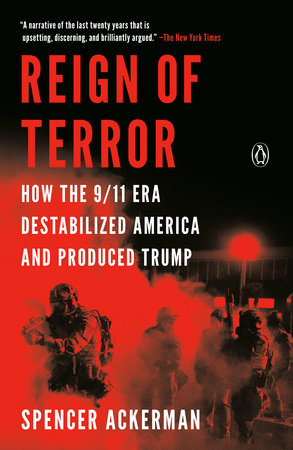And that brings us to Trump. Superficial readings of Trump would portray him as an opponent of the War on Terror. He claimed to have opposed the Iraq War; he insulted Bush and military families; he said he would bring troops home. But Ackerman argues that Trump’s victory in 2016 did not present a repudiation of the War on Terror. Rather, it was a product of it. By the time Trump was running for president, fears about immigration and the rise of ISIS were feeding what Ackerman describes as a “white nativist appetite for a narrative of besiegement, replacement, abandonment, and betrayal.” Ted Cruz tried to tap into these sentiments, arguing that “the front line with ISIS isn’t just in Iraq and Syria, it’s in Kennedy Airport and the Rio Grande.” But it was Trump who knew how to use the jingoism of the War on Terror to stoke grievance and offer a respite from its humiliations.
Rather than breaking with the War on Terror, Trump removed Obama-era restrictions and brought it home. He intensified bombing campaigns in Afghanistan that increased civilian casualties. Over his first two years, he launched more drone strikes than Obama had in his most intense period of their use. At home, Trump empowered ICE and Customs and Border Protection to act with special brutality: famously separating families, but also using prolonged cold and light exposure in ways that resembled the techniques of CIA torture. He treated anti-fascist activists as domestic terrorists, and when Black Lives Matter protests surged in 2020, he turned the apparatus of counterterrorism against them, too. Though there was no danger to him whatsoever, Trump spent the first Sunday of protests over the police murder of George Floyd in the bunker where Dick Cheney spent 9/11.
In the genre of books that seek to explain why we are in the mess we are in, Reign of Terror is a formidable entry. To those who want to portray Trump as wholly exceptional, and discontinuous with the recent past, the book is an essential corrective. It roots Trump in white racial grievance of long standing, and shows how militarized counterterror prepared a significant minority of Americans to turn to him to escape the indignities that, for Trump’s base, included 9/11 itself, Bush’s failures, and Obama’s existence. It is not to deny that Trump presented in some ways novel challenges to American society and government to note that if you are looking for examples of executive lawbreaking, ex cathedra mendacity, administrative incompetence, and intentional cruelty inflicted as policy, it is not necessary to reach back further than Bush.
